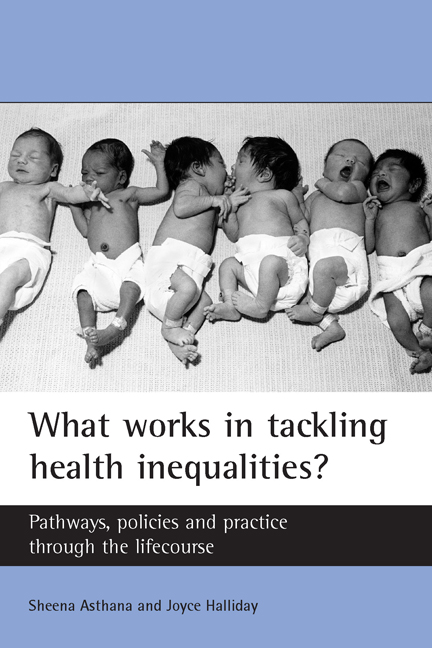Book contents
- Frontmatter
- Dedication
- Contents
- List of tables, boxes and figure
- Acknowledgements
- List of abbreviations
- one Introduction
- Part 1 The research and policy context of health inequalities
- Part 2 Health inequalities pathways, policies and practice through the lifecourse
- Part 3 Tackling health inequalities: developing an evidence base for public health
- Index
three - The national policy context
Published online by Cambridge University Press: 14 January 2022
- Frontmatter
- Dedication
- Contents
- List of tables, boxes and figure
- Acknowledgements
- List of abbreviations
- one Introduction
- Part 1 The research and policy context of health inequalities
- Part 2 Health inequalities pathways, policies and practice through the lifecourse
- Part 3 Tackling health inequalities: developing an evidence base for public health
- Index
Summary
Introduction
Chapter Two described the important academic legacy of the Black Report (1980), and also noted that, although the Report was coolly received by the Conservative government of the time, its recommendations have shaped the subsequent formulation of policy. Ironically, while the Black Report was criticised for the costs that it gave to its proposals, its successor, the Acheson Report, was criticised for not providing detailed costs. This, it was argued, would not provide government with sufficient information about the affordability and cost-effectiveness of proposals to encourage a policy response. In fact, the Labour government can claim to have responded to most of the recommendations made in the Acheson Report (1998). However, policy responses to the broad areas identified by the Independent Inquiry can be either conventional or radical and many would argue that the government's response to the materialist/structural factors identified in the Report has not been radical enough.
As one of the government's responses to the Acheson Report included the commissioning of a Cross-cutting Review to explore how links could be strengthened between government departments to address ‘underlying determinants of health inequalities’, it seems ungenerous to question its commitment to undertaking the necessary structural reforms. In practice, however, the way in which ‘underlying determinants’ have been defined has become increasingly narrow over time. For example, the government has set the Department of Health (DH) Public Service Agreement (PSA) targets to reduce variations in mortality and life expectancy between the fifth of areas with the worst health and deprivation indicators (the Spearhead Group) and the population as a whole. This has certainly given an increased profile to tackling inequalities in health. However, the objective of tackling the “underlying determinants of ill health and health inequalities” by reducing adult smoking rates, reducing the year-on-year rise in child obesity and reducing the under-18 conception rate suggests a somewhat narrow interpretation of the causes of variations in health (www.hm-treasury.gov.uk/media/4B9/FE/sr04_psa_ch3.pdf).
Government commitment to addressing what might normally be described as underlying determinants of health inequalities is apparent in other PSAs. In education, for example, more challenging ‘floor targets’ have been set to drive further improvements in schools in deprived areas, while local authority wards with the worst labour market performance are expected to increase the employment rate on average by 1%.
- Type
- Chapter
- Information
- What Works in Tackling Health Inequalities?Pathways, Policies and Practice through the Lifecourse, pp. 57 - 106Publisher: Bristol University PressPrint publication year: 2006



